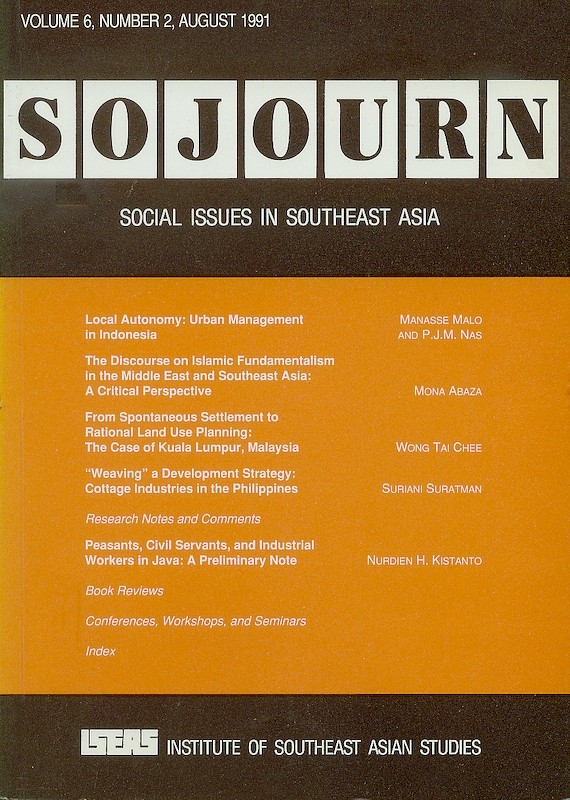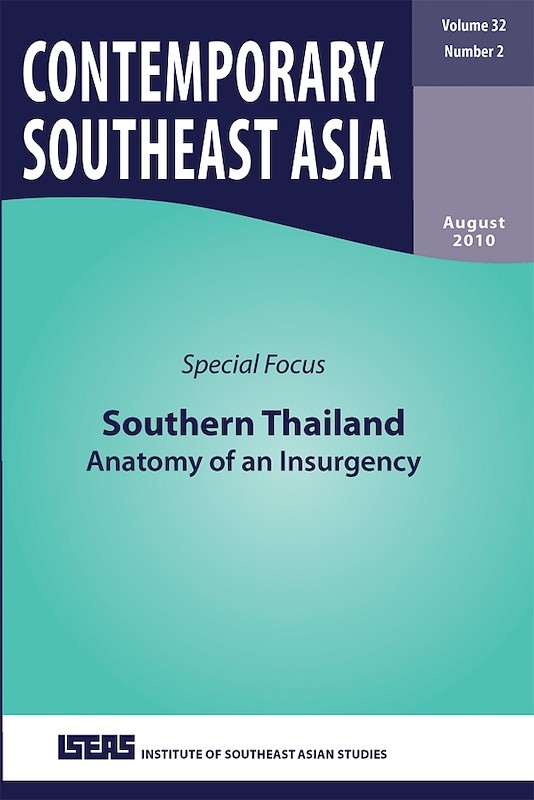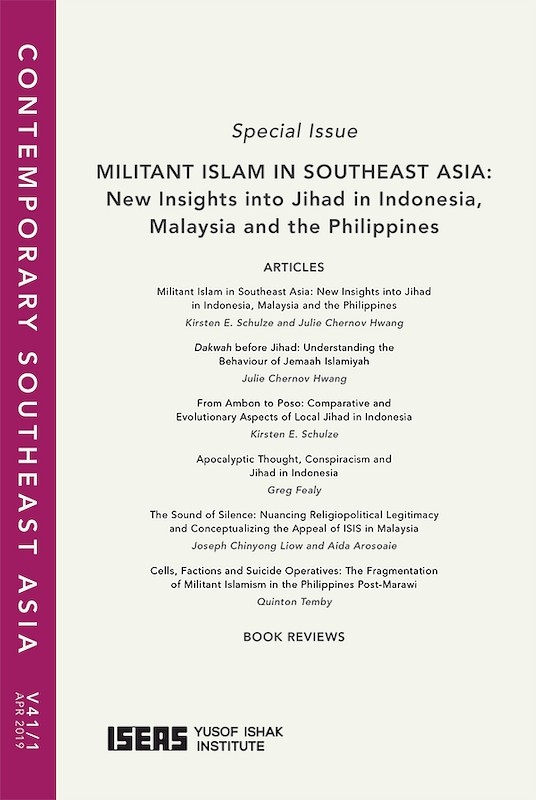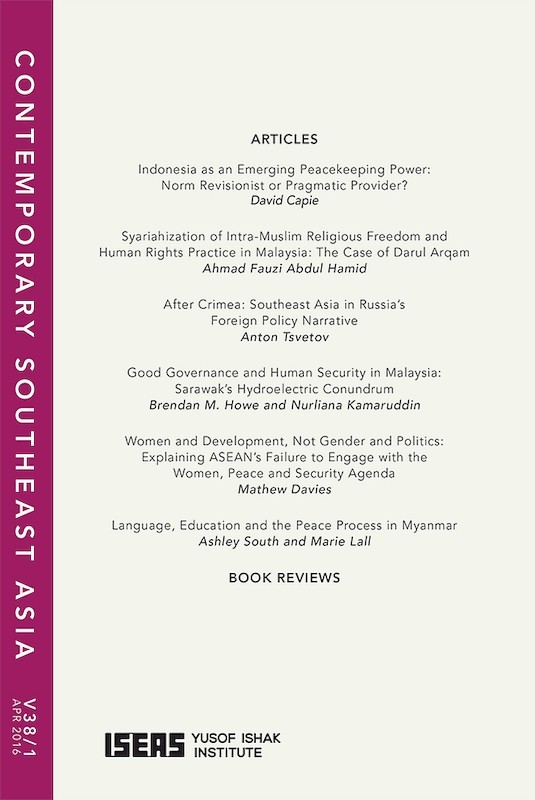SOJOURN: Journal of Social Issues in Southeast Asia Vol. 17/2 (Oct 2002)
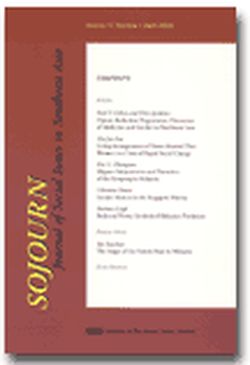
Date of publication:
November 2002
Publisher:
Institute of Southeast Asian Studies
Number of pages:
188
Code:
SJ17/2
Contents
-
SOJOURN: Journal of Social Issues in Southeast Asia Vol. 17/2 (Oct 2002)
-
Preliminary pages
- ARTICLES
-
Civil Society in Indonesia: The Potential and Limits of Muhammadiyah, by Muhammad Fuad, author see abstractWith the help of two case studies, a hospital and a school, this article looks at how grassroots initiatives can be a key impetus for the growth in health and education services provided by the Muhammadiyah movement. Such local initiatives are partly driven by a sense of competition with the Christians as well as other Islamic movements. They also come with their own internal politics that are free of external interference. In that sense, the growth of Muhammadiyah activities constitutes a civil society space independent of the state. Independence does not mean that such activities need to be in conflict with the state. In effect, there is a mutually reliant and complementary relationship between Muhammadiyah social services and the state that subsidizes them to varying degrees. These factors describe Muhammadiyah's potential for growth as a civil society actor. However, the movement also faces limitations such as the paucity of economic resources. Ultimately, there also remain major dilemmas such as the contending claims of religious tenets and modernity or to uphold Islam through power politics or cultural politics.
-
The Indonesian Islamic Debate on a Woman President, by Nelly Van Doorn-Harder, author see abstractThis paper traces the debate by Indonesian scholars of Islam concerning the acceptability of a woman as president according to the sources of Islam. The actual goal of the debate was purely political and aimed at preventing Megawati Soekarnoputri from reaching the position of president. Religious argumentations were used to circumvent the popular vote. Religious reasoning, however, was heavily mixed with arguments and biases against women derived from politics, local culture, and social hierarchy. The debate caught the national attention since it raised principal questions about who holds the authority over the formation of religious opinions and about the protection of women's rights as assigned to them by the holy sources of Islam. In the long run, the debate did not just concern Megawati's bid for the presidency, but opened the door for abuse of the holy texts.
-
"He Is Your Garment and You Are His ...": Religious Precepts, Interpretations, and Power Relations in Marital Sexuality among Javanese Muslim Women, by Lily Zakiyah Munir, author see abstractThree case studies of Javanese Muslim women excavate their marital lives to unpack some of the complexities of Javanese and Islamic traditions that condition their sexual relationship with their husbands. Both these traditions in their practice underline a patriarchal society that subjugates women in sexual and marital relations. The case for women's subordinate position in Javanese Muslim society shares some common philosophical grounds with the perspective of Western radical feminists in the 1970s. However, this is not a discourse pitting Western liberalism against a restrictive Islamic orthodoxy. Instead, the discussion draws on Islamic precepts that preach equity in gender relations and examines how they can coexist with certain Islamic practices that are unfair to women. The women in these studies vary in their abilities to draw on their religious grounding to negotiate a way out of unsatisfactory matrimonial situations. Their experiences provide an opportunity to discuss how religious texts should be understood when what they prescribe is subject to conflicting interpretations.
-
Looking Beyond Bien Che: The Considerations of Young Vietnamese Graduates When Seeking Employment in the Doi Moi Era, by Phuong An Nguyen, author see abstractThe process of doi moi has brought about profound changes in perception and practice of employment among young Vietnamese. Generally, youths in Vietnam today no longer conceive of employment as a job for life in the state sector. Instead, there is a trend for the young to stay away from the state sector in search of more challenging, dynamic, exciting, and rewarding opportunities. These changes reflect the image of a new generation that is generally open-minded in their way of thinking, as well as flexible and responsive to economic reforms.
-
Transborder Business: The "Capital" Input in Singapore Enterprises Venturing into ASEAN and Beyond, by Heidi Dahles, author see abstractAfter decades of inviting foreign companies to invest in Singapore, the government of the city-state recently has started to encourage domestic entrepreneurs to expand their businesses abroad. This paper investigates the various ways in which domestic Singaporean businesses respond to these policy measures. Focusing on shifts in capital input defined in terms of economic (start-up capital), social (networks), and cultural (certified knowledge) capital three different transborder business strategies are identified: "conventional", "hybrid", and "new". In contrast to conventional (that is, family-based and government-initiated) patterns of transborder ventures, "new" entrepreneurs rely on personalized networks to expand their businesses into a myriad of foreign countries. A hybrid and rather popular strategy is being a subcontractor of multinational corporations, which leaves risks involved with transborder business expansion to the contractor, while benefiting from new production sites and markets.
-
Socio-Economic Change and Rural Entrepreneurs in Pre-Crisis East Java, Indonesia: Case Study of a Madurese Upland Community, by Ernst Spaan, Aard Hartveld, authors see abstractThis paper examines the roles and economic strategies of rural entrepreneurs in a Madurese community in East Java, Indonesia. The incorporation of rural communities into the regional economy through commercial sugarcane production provided opportunities for entrepreneurs to expand their enterprises. They diversified their economic activities through their investment strategies and social networking. They dominated the local economy through their attempts to monopolize the resources provided by state agencies and brokers at the supra-local level. The entrepreneurs served as catalysts in the process of economic diversification, which sees a shift from subsistence agriculture to cash cropping. That had caused labour redundancy. The monopolization of job brokerage by village entrepreneurs, mediating between increasingly redundant manpower and external (international) labour markets, provided a new avenue for economic diversification and capital accumulation.
- BOOK REVIEWS
-
BOOK REVIEW: Southeast Asian Urbanism: The Meaning and Power of Social Space. By Hans-Dieter Evers and Rudiger Korff, by Yeoh Seng Guan, author
-
BOOK REVIEW: Jakarta-Batavia: Socio-Cultural Essays. Edited by Kees Grijns and Peter J.M. Nas, by Widya Nayati, author
-
BOOK REVIEW: Modern Trends in Islamic Theological Discourses in Twentieth Century Indonesia: A Critical Survey. By Fauzan Saleh, by Abubakar Eby Hara, author


